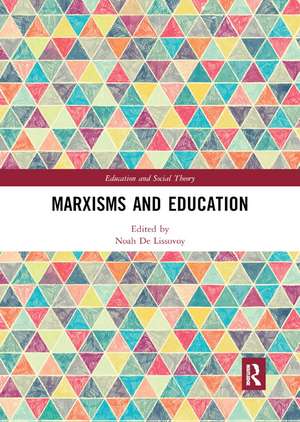Marxisms and Education: Education and Social Theory
Editat de Noah De Lissovoyen Limba Engleză Paperback – 13 dec 2019
| Toate formatele și edițiile | Preț | Express |
|---|---|---|
| Paperback (1) | 260.54 lei 6-8 săpt. | |
| Taylor & Francis – 13 dec 2019 | 260.54 lei 6-8 săpt. | |
| Hardback (1) | 764.20 lei 6-8 săpt. | |
| Taylor & Francis – 2 ian 2018 | 764.20 lei 6-8 săpt. |
Preț: 260.54 lei
Preț vechi: 311.70 lei
-16% Nou
Puncte Express: 391
Preț estimativ în valută:
49.87€ • 51.86$ • 41.79£
49.87€ • 51.86$ • 41.79£
Carte tipărită la comandă
Livrare economică 14-28 martie
Preluare comenzi: 021 569.72.76
Specificații
ISBN-13: 9780367891374
ISBN-10: 0367891379
Pagini: 260
Dimensiuni: 174 x 246 mm
Greutate: 0.48 kg
Ediția:1
Editura: Taylor & Francis
Colecția Routledge
Seria Education and Social Theory
Locul publicării:Oxford, United Kingdom
ISBN-10: 0367891379
Pagini: 260
Dimensiuni: 174 x 246 mm
Greutate: 0.48 kg
Ediția:1
Editura: Taylor & Francis
Colecția Routledge
Seria Education and Social Theory
Locul publicării:Oxford, United Kingdom
Public țintă
Postgraduate, Professional, and UndergraduateCuprins
Introduction 1. Learning by dispossession: democracy, promotion and civic engagement in Iraq and the United States 2. Critical Pedagogy and Class Struggle in the Age of Neoliberal Globalization: Notes from History’s Underside 3. Porto Alegre as a counter-hegemonic global city: building globalization from below in governance and education 4. Economic crisis, accountability, and the state’s coercive assault on public education in the USA 5. Between education and the economy: high-stakes testing and the contradictory location of the new middle class 6. Globalisation and Its Educational Discontents: neoliberalisation and its impacts on education workers’ rights, pay and conditions 7. The Race for Class: Reflections on a Critical Raceclass Theory of Education 8. Accumulation of the primitive: the limits of liberalism and the politics of occupy Wall Street 9. Pedagogy in Common: Democratic education in the global era 10. Jacques Rancière, Education, and the Art of Citizenship 11. Defining the political ontology of the classroom: toward a multitudinous education 12. Studying like a communist: Affect, the Party, and the educational limits to capitalism 13. Neoliberalism in the Academic Borderlands: An On-going Struggle for Equality and Human Rights
Notă biografică
Noah De Lissovoy is Associate Professor of Cultural Studies in Education at the University of Texas at Austin, USA. His research centers on critical approaches to education policy, curriculum, and cultural studies, with a special focus on the intersecting effects of race, class and capital. He is the author of Power, Crisis, and Education for Liberation (2008) and Education and Emancipation in the Neoliberal Era (2015), and co-author of Toward a New Common School Movement (with Means and Saltman, 2014).
Descriere
Starting from the premise that a range of Marxist theoretical tendencies, or Marxisms, inform recent critical scholarship in education, this volume rearticulates and interrogates the philosophical and practical commitments in this tradition. Chapters engage issues including the meaning of democratic education, neoliberalism’s ideological and mat











